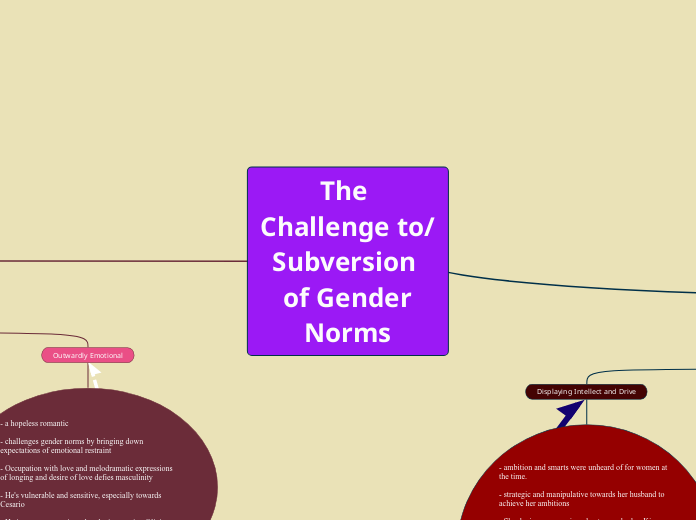The Challenge to/ Subversion of Gender
Norms
Macbeth
Lady Macbeth
Displaying Intellect and Drive
- ambition and smarts were unheard of for women at the time.
- strategic and manipulative towards her husband to achieve her ambitions
- She devises an amazing plan to murder her King which shows her boldness and determination
- ability to manipulate her husband allows us to see her shrewd intellect and resourcefulness.
- Her role as the mastermind behind the scheme to murder King Duncan, challenges traditional gender norms by demonstrating power and pursuit of her goals.
- Throughout the story she defies societal constraints and uses them to her advantage.
Recognizing the Need for Masculity to Thrive
- She was anything but delicate.
- "Come, you spirits / That tend on mortal thoughts! unsex me here, / And fill me from the crown to the toe top full / Of direst cruelty" (1.5.42-51) Shows her belief that she must adopt masculine traits to hold power.
- Knows she needs to be masculine to thrive, and she uses her gender to assert authority and influence over her husband.
- protective actions of characters like Macduff, (who attempts to shield her from Macduff) shows perception of women as fragile and powerless.
- Even her husband believes her to be masculine. "may you only give birth to male children, because you're Fearless Spirit could create nothing that isn't masculine." (1,7, 72-74)
Her relationship
Macbeth
His relationship
Outwardly Emotional
- Emotional turmoil is very evident throughout the entire play
- grapples with guilt and remorse
-has hesitance and reluctance to commit regicide. "we can't go on with this plan. The King has just honored me, and I have earned the good opinion of all sorts of people." (1.7. 32- 35) (men can't hesitate 🤬)
- hesitance, is often attributed to feminine traits, is further emphasized when he succumbs to Lady Macbeth's persuasion.
- Emotions intensify which leads to hysteria and irrationality; which were historically associated with women.
- intense emotions challenge expectations of male stoicism.
Ambition driven by external influence
- ambition, which normally is a masculine trait is shaped by external influences.
- it isn't from desire for power, Macbeth's ambition is fueled by Lady Macbeth and the witches
- susceptible to manipulation- a trait associated with femininity.
- hesitates to act upon his ambition,which contrasts with typical portrayals of masculinity as decisive and uncowardly.
- The involvement of Lady Macbeth and the witches shows interplay between gender and Power because Macbeth's ambition is directly intertwined by the influence of women.
Twelfth Night
Viola (Cesario)
Cross-dressing
- By disguising herself as a man, Viola begins starts doing "male activities" showing that women can do anything.
- She shows her intelligence, wit, and bravery in her daily life, even in act one where she is still dressed as a woman
- Her crossdressing makes characters and audiences to begin to question the nature of gender identity and expression
- We never see Viola acting the part of woman after she dresses as Cesario. Even after Orsino asks Viola to wear women's clothes “Give me thy hand; and let me see thee in thy woman's weeds." (5.1.276), we never see her in feminine clothing.
- Implies a preference for her
male alter ego
- Her willingness to go back to womanhood for Orsino could mean that
she is be comfortable as both genders, or neither.
Displaying Intellect and Drive
- Instead finding a man to protect her or accepting fate, she immediately takes action for her survival.
- She makes a plan and disguises herself as a man and got employed by Duke Orsino.
- She has many resourceful and strategic qualities that are never associated with women in that era.
- She also challenges the stereotype of women being passive or easily overwhelmed by using her wit and charm in social situations.
- She maintains a sense of confidence in her endeavors.
Recognizing the Need for Masculity to Thrive
- Viola understands that presenting herself as a man will give her freedom.
- She could have conformed to societal expectations by simply accepting her fate but instead she takes the opportunity for freedom
- Quickly understands that if she didn't dress as a man, she would not be safe
Duke Orsino
Homosexual tendency
- Has intense homosexual tendencies with Cesario.
- He has a direct emotional attachment to Cesario and confides in him about very personal things
- Seems to not have interest in Olivia's physical appearance in text but then proceeds to talk about Cesario's feminine features in a seductive way. "Thy say thou art a man; Diana's lip is not more smooth and Rubious; thy small pipe is as the maidens organ shrill and sound," (1.4.32-34)
Desire for emotional connection over physical attraction
- His pursuit of Olivia is an emotional connection.
- Doesn't see Olivia as a conquest to be won through physical charm or seduction, its fueled by a deep longing for emotional intimacy and companionship.
- He makes passionate speeches and melancholy music, that show his want for a emotional bond rather than physical gratification.
- Subverts societal norms that often say that men desire physical attraction more than emotional attraction
- "but mine is always as hungry as the sea, and can consume as much. Make no comparison between the love a woman could have for me and that I have for Olivia." (2,4,106-109)
- Orsino compares the depth of his love the hunger as the sea.
- His love seems to be rooted in emotional hunger
Outwardly Emotional
- a hopeless romantic
- challenges gender norms by bringing down expectations of emotional restraint
- Occupation with love and melodramatic expressions of longing and desire of love defies masculinity
- He's vulnerable and sensitive, especially towards Cesario
- He is never aggressive when he is pursuing Olivia
- He still attempts to persuade her instead of using his male authority over her
